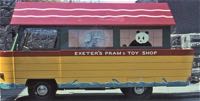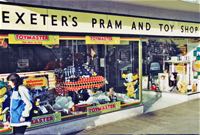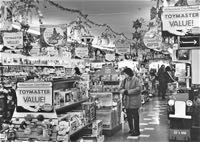
Exeter's Pram and Toy Shop
aka Exeter Cycle Works
Page uploaded 10th September 2016
Return to Retail Exeter
Also see Exeter's Pram and Toy Shop on ToyShopUK
 Of all the local businesses that have closed in Exeter over the last few years, Exeter's Pram and Toy Shop is arguably, along with Waltons, one of the businesses missed the most by many Exonians. The Pram and Toy Shop was a real toy shop, the sort that thousands of children loved to visit. It was situated in a post war building right next to Debenhams (now John Lewis), in Sidwell Street.
Of all the local businesses that have closed in Exeter over the last few years, Exeter's Pram and Toy Shop is arguably, along with Waltons, one of the businesses missed the most by many Exonians. The Pram and Toy Shop was a real toy shop, the sort that thousands of children loved to visit. It was situated in a post war building right next to Debenhams (now John Lewis), in Sidwell Street.
Motors and Cycles
The business was founded by Percy John Hawkins around about 1906, this being the first year in which adverts were placed in local newspapers. Hawkins wasn't new to the trade because he had been the manager of Frank Chick's cycle and motor cycle business in the old Post Office Chambers in Queen Street for several years.
The earliest advert for the then named Exeter Motor and Cycle works, at 43 Sidwell Street, was from the June 1906 Western Times. By November 1907 the name had changed to the Exeter Cycle works and the business had branched into selling and maintaining phonographs. The mechanical skills needed to service bicycles was very similar to the skills needed to look after the mechanism of a gramophone. An advert from 29 November 1907 in the Western Times for the phonograph:
“SECOND-HAND EDISON PHONOGRAPH 20s, SECOND-HAND PERFECTA, 25s; and “new and Up-to-Date RECORDS 6d each, while they last. Exeter Cycle Works, 43, Sidwell-street, Exeter”
Another advert from the Western Times on 13 December 1907 stated:
“PHONOGRAPH RECORDS AT 6d.-Still a few left, including many Christmas Carols. Ask to hear the new Edison Bell Extra Long Records at 9d. — Exeter Cycle Works, 43, Sidwell-street, Exeter.”
In a series of adverts in April 1908 the business was promoted as the sole distributor of Humber bicycles in Exeter. Bicycles in the summer, and phonographs in the winter was a canny move, and would have smoothed out trade through the year for Mr Hawkins. During that summer season, many models of second-hand bikes were offered with easy payments. Bicycles were wanted to purchase, to refurbish and sell on. Although using simple line adverts, Hawkins knew how to promote a business and increase trade. Every week a different advert would appear with a new promotion. One advert finished with “The cheapest in the end, and you know it.” By 1912, prams were added to the range to buy, and a repair workshop opened. Hawkins also took over the business of Frank Chick in Queen Street, his former employer..
The First War and the baby boomers
Ever a one to catch the latest trend, or the social mood, Percy Hawkins stocked a whole list of “PATRIOTIC GRAMOPHONE RECORDS. 1s. 6d. each (double-sided).” in August 1914, three weeks after war was declared. He would also despatch them by post to purchases outside of the city. During the war, prams and ‘baby cars’ were a best seller judging by the promotions in the newspapers. Percy was setting up his business for what was to be the greatest baby boom in the 20th century–starting in 1914 and peaking in 1920 (1). During these years the Exeter Cycle Works should have been named the Exeter Pram Shop, as nearly every advert was for prams and baby carriages.
After the war, as men were demobbed, sales of bicycles started to recover, while a toy department was in existence by 1923, to cater for the large number of young children. The same year Percy Hawkins exhibited an electrically lit dolls house at the West of England Exhibition at the Civic Hall; a lottery was held for the house, which was won by Nurse Peggy Salter, with the proceeds going to the Dr Barnardo’s Home in Exeter. The company became a regular donor of prizes to charity draws through the years.
June 1924 was a time of expansion as the Exeter Cycle Works opened eight showrooms for the baby-car, nursery equipment and toy department at 174 Sidwell Street. The old premises had been outgrown, although cycles and phonographs would remain at the 43, Sidwell Street. Later in the year, three lads were given six strokes of the birch for breaking into the workshop at No 43; although they took nothing, they did some damage.
Further expansion took place when the cycle department moved to 116, Sidwell Street, in 1928, with the claim they had the largest selection of cycles in the west. Always trying to catch the public imagination, any child who owned a 1932 pedal car was reminded by “the largest Toy Shop in the West”, that they needed no license and could drive on the footpath.
In 1934, Percy Hawkins son Leslie ‘Jack’ Hawkins married at Pinhoe Church. The wedding was well attended, especially by members of the Exeter Motor Club and Exeter Amateur Rowing Club, of which Mr Hawkins was an enthusiastic member. Jack Hawkins was involved in the business, and in 1935 he won the Jubilee Prize for the best window display in Sidwell Street.
The Second War
The company continued to advertise for much of the Second War with small line adverts. By 1945 they ran the strap line “Exeter’s Popular Pram and Toy Shop”, suggesting a change of name was imminent. Jack and his brother Ted took over the running of the business from their father from 174 Sidwell Street. Bert Hooper supervised the large workshop at the rear, repairing prams, cycles and toys. It was the brothers who came up with the idea of having a ‘special’ vehicle built for deliveries–the result was the famous and iconic Noah’s Ark delivery vehicle.
Post war
No 174 and the rest of the block in Sidwell Street were demolished, in the post war rebuilding, and the Pram and Toy Shop moved into a new, purpose built shop, next to the new Debenhams department store (John Lewis), in November 1963. The new premises, because of the slope of the site, was built on five floors, with a basement for delivery and staff room. Many will remember the painted snake stair rails to the upper showroom. The ground floor displayed bicycles and prams, while the small boys favourite, Hornby model railways were on the first floor. On the side of the building was fixed a large, iron stork with a baby hanging below its beak, indicating the position of the shop from way down the High Street.
The third generation of Hawkins, Peter and Tim took over from Jack and Ted. Fashion in toys evolved, and when the Star Wars characters, Darth Vader, Boba Fett and a Stormtrooper visited the store, hundreds of excited fans turned up. The business joined the Toymaster group, a federation of independent toy shops which could negotiate better prices for their member shops.
The business expanded into Exmouth, Taunton, Newton Abbot and Barnstaple, with a warehouse on Sowton industrial estate. The introduction of the internet, and out of town shopping centres increased competition for local toy shops, and in September 2000, Exeter's Pram and Toy Shop closed for the last time. The shop is now occupied by a small Sainsburys.
Sources: BBC News Magazine, British Newspaper Archive (Western Times, Express and Echo), toyshopuk.co.uk (short history)
(1) The baby boom during and after the First War was larger than the baby boom after the Second War. The peak year for births was 1920.
│ Top of Page │



